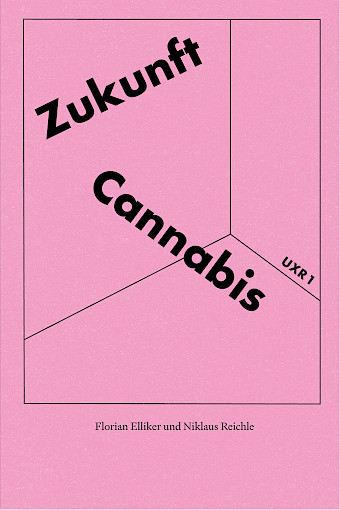Research - 21.08.2025 - 13:00
‘We are constantly on the lookout for research topics – even in our private lives,’ says Florian Elliker. He and Niklaus Reichle are sociologists at HSG and form the research collective ‘Unexplored Realities’ at the Department of Sociology. They explore topics that are rarely addressed in everyday life, the media and the social sciences – or seek new perspectives on widely discussed issues.
Unexplored Realities also wants to take a fresh look at cannabis: in 2026, it plans to conduct studies in the cantons of St. Gallen and Ticino in which several thousand participants will be able to legally purchase cannabis. Similar trials have been or are currently being conducted in Zurich, Lausanne and other Swiss cities. The federal government is monitoring the trials and hopes to gain insights into the legalisation of cannabis. ‘We are also particularly interested in how and why people who are able to reconcile cannabis use with their private and professional lives do so,’ says Elliker. The two sociologists refer to this as ‘successful consumption’.
According to Reichle, science has so far focused on the problematic aspects of cannabis use. ‘Yet around 80 percent of users have a generally problem-free relationship with the substance. We want to find out how they manage their consumption.’
‘We are not making any judgements. Our interviews so far show that the respondents themselves are able to assess whether and when their consumption is successful,’ says Elliker. Only people who already consume cannabis regularly can take part in the study.
In order to identify patterns of successful consumption, the two sociologists, supported by a small team, want to conduct in-depth qualitative interviews with around 100 study participants.
Qualitative means that the interviews are not intended to test hypotheses. Instead, the information obtained in this way will be categorised and summarised. In parallel, they will regularly survey the several thousand participants in the two studies using quantitative questionnaires. They will test several hypotheses, including those on different typical patterns of cannabis use and the relationship between life circumstances and unproblematic consumption.
In 2022, the sociologists in St. Gallen conducted a preliminary study in which they surveyed 30 users.
The upcoming trials involving the legal distribution of cannabis in St. Gallen and Ticino still need to be approved by the Federal Office of Public Health. The two HSG researchers expect them to start in the course of 2026. ‘If legalisation does come about in the next few years, we need to be aware that this will open up a market with economic potential,’ says Reichle.

In summer 2025, Unexplored Realities also published the book 'Zukunft Cannabis' (The Future of Cannabis). According to the blurb, the 104-page book aims to provide an overview of the most important questions surrounding the changing social attitudes towards cannabis. The booklet is available free of charge in digital format from Seismo-Verlag and is aimed ‘at the interested public, politicians, journalists and, above all, social scientists,’ according to the publisher.
‘As scientists, we have a responsibility to make our findings accessible and understandable to a wide audience,’ says Reichle. They want to reach beyond the circle of scientific publications, as evidenced by the appealing design and readable tone of ‘Zukunft Cannabis’. The book examines cannabis from a variety of professional perspectives, with contributions from HSG historian Caspar Hirschi, HSG sociologist and Latin America expert Matias Dewey, and long-standing addiction expert and psychiatrist Toni Berthel.
The thematic diversity of the research collective is demonstrated by another project that is driving ‘Unexplored Realities’: between 2017 and 2021, they investigated how the post-apartheid transformation is taking place in student halls of residence at South African universities. The focus was on white students, particularly those who speak Afrikaans. ‘They suddenly find themselves in the minority at universities and have to come to terms with a new role,’ says Elliker.
He and Reichle spent several days with the students as participant observers – a research method used in ethnography – observing and interviewing them. They also made film recordings.
‘Over time, we realised that the topic was very rich, but that we didn't have the resources to produce a compelling film,’ says Reichle. He got in touch with documentary filmmaker Fabienne Steiner, who grew up in South Africa until her teenage years.
Steiner and co-author and editor Michael Bolliger accompanied the sociologists into the field and later travelled to South Africa several times on their own. The resulting film, ‘Fitting In’, follows students at the prestigious Eendrag student residence at Stellenbosch University for a whole year. According to the description, ‘young men from all walks of life encounter colonial structures and traditions’.
The film has also enjoyed international success: it was screened at the ‘Visions du réel’ documentary film festival in Nyon, the Festival Internacional de Cine Independiente in Buenos Aires and the Encounters Film Festival in South Africa. Screenings are also planned in Switzerland and St. Gallen (see below).
Unexplored Realities wants to remain receptive and bring niche topics to the fore: it is also interested in architecture, urban planning, power structures and shifts, and society's approach to psychedelic substances. ‘We won't get bored – there are still many socially relevant topics that receive too little attention in mainstream science,’ says Elliker.
Screening dates:
Previews: 16 September 2025, kult.kino Basel / 17 September 2025, Riffraff Zurich
Premiere: 18 September 2025, Kinok St. Gallen (further screenings in October)
![[Translate to English:] Die HSG-Soziologen Florian Elliker und Niklaus Reichle erforschen wenig beleuchtete Themen. | unisg.ch](https://www.unisg.ch/fileadmin/_processed_/d/f/csm_Die_HSG-Soziologen_Florian_Elliker_und_Niklaus_Reichle_b82fbe757b.jpg)